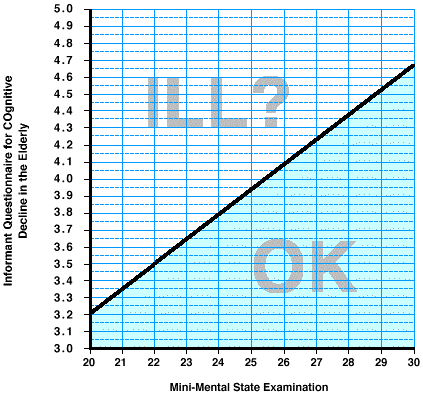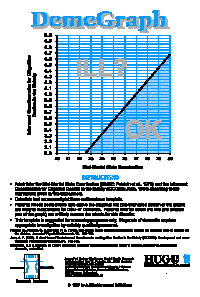

The DemeGraph is an aid to assessing patients
for dementia by combining standard cognitive testing with a formal means of
assessing an informant's view of changes in the patient's memory and cognitive
functioning.
Administer the Mini-Mental State Examination (MMSE; Folstein et al., 1975) according to the instructions given by the test authors.
Have an informant who knows the subject well complete the Informant Questionnaire for Cognitive Decline in the Elderly (IQCODE; Jorm, 1994).
Calculate test scores and plot them on the DemeGraph template:

Patients whose score profile falls above the
diagonal line (the unshaded portion of the graph) are likely to meet criteria
for DSM-IV Dementia. Patients who fall below the line (the shaded part of the
graph) are unlikely to meet the criteria for this disorder. On the above
template, one patient, marked with a ![]() has an MMSE score of 27 and an IQCODE
score of 4.5 (halfway between 'A bit worse' and 'Much worse' on the IQCODE
scale). This score combination lies in the unshaded part of the graph and so
DemeGraph classifies them as likely to be a case of dementia. Another patient
marked with a
has an MMSE score of 27 and an IQCODE
score of 4.5 (halfway between 'A bit worse' and 'Much worse' on the IQCODE
scale). This score combination lies in the unshaded part of the graph and so
DemeGraph classifies them as likely to be a case of dementia. Another patient
marked with a ![]() has an
MMSE score of 23.5 and an IQCODE score of 3.1 (just above 'Not much Change' on
the IQCODE scale). This person is classified by the DemeGraph as unlikely to
meet criteria for a diagnosis of dementia.
has an
MMSE score of 23.5 and an IQCODE score of 3.1 (just above 'Not much Change' on
the IQCODE scale). This person is classified by the DemeGraph as unlikely to
meet criteria for a diagnosis of dementia.
Folstein, M., Folstein, S., & McHugh, P. R. (1975).
Mini-Mental State: a practical method for grading the cognitive state of
patients for the clinician. Journal of Psychiatric Research, 12,
189-198.
Jorm, A. F. (1994). A short
form of the Informant Questionnaire on Cognitive Decline in the Elderly
(IQCODE): Development and cross-validation. Psychological Medicine, 24,
145-153.
The DemeGraph template is offered for screening purposes only. Diagnosis of dementia requires appropriate investigation by suitably qualified professionals.
The research project that produced the Demegraph was published as "Andrew Mackinnon and Reinhild Mulligan, Combining cognitive testing and informant report to increase accuracy in screening for dementia American Journal of Psychiatry, vol 155, pp. 1529-153 1998." If you use the DemeGraph in research, you should cite this paper.
Abstract
Objective:Cognitive testing and an informant report questionnaire were combined to determine whether their use in combination could improve accuracy in screening for the diagnosis of dementia over either test used alone. Methods of combining test scores that can be readily applied in clinical settings were developed and assessed.
Method:The subjects were 106 patients admitted to the geriatric hospital or outpatients assessed at the memory clinic of the university hospital system in Geneva, Switzerland. The instruments used were the Mini-Mental State and the short form of the Informant Questionnaire on Cognitive Decline in the Elderly. The diagnosis of dementia was made according to DSM-IV criteria.
Results:Logistic regression demonstrated that the combination of the Mini-Mental State and the Informant Questionnaire on Cognitive Decline in the Elderly resulted in more accurate prediction of caseness than either test alone. The performance of logical "or" and "and" combinations of test results and a weighted sum of scores on the two tests as screens for dementia were investigated by using receiver operating characteristic analysis. By using suitable cutoff points, both the "or" rule and the weighted sum were shown to be capable of improving performance over that of either test used alone.
Conclusions:This study shows that informant report can be formally incorporated into assessment for dementia in such a way as to increase the accuracy of detection of cases and noncases. A graphical method was developed that enables the most robust approach to be applied to individual cases without any calculationClick here to access the full text original paper.
Download the DemeGraph
 |
| |
|
|
Download the DemeGraph in Abode Acrobat format. This file can be read with a free reader or plug-in and printed out to the maximum capabilities of your printer. | |
|
To ensure that the downloadable version of the DemeGraph is as close as possible to the printed materials we have used the Adobe Acrobat format. A free Acrobat Reader for a wide range of computers is available by selecting the icon to the left. | ||
|
| ||
|
At the time of conducting research on
the DemeGraph - | ||
|
Assoc. Prof. Andrew Mackinnon was Head of the Biostatistics and Psychometrics Unit at the Mental Health Research Institute of Victoria. He was also a member of the Department of Psychological Medicine at Monash University Melbourne, Australia. |
Dr Reinhild Mulligan was director of the Consultation Mémoire, Hôpitaux Universitaires de Genève and a member of the Department of Psychiatry of the University of Geneva. | |
Andrew's current contact details are available here. | ||
If you are interested in psychogeriatric assessment, you may find our Psychogeriatric Assessment Scales home page of interest. The Psychogeriatric Assessment Scales provide a more comprehensive assessment of cognitive status and depressed mood in older persons. The User's Guide and all necessary materials are available from the PAS web site.